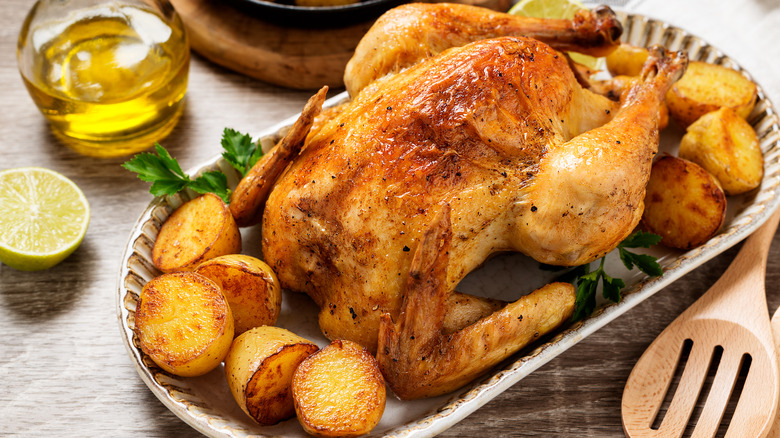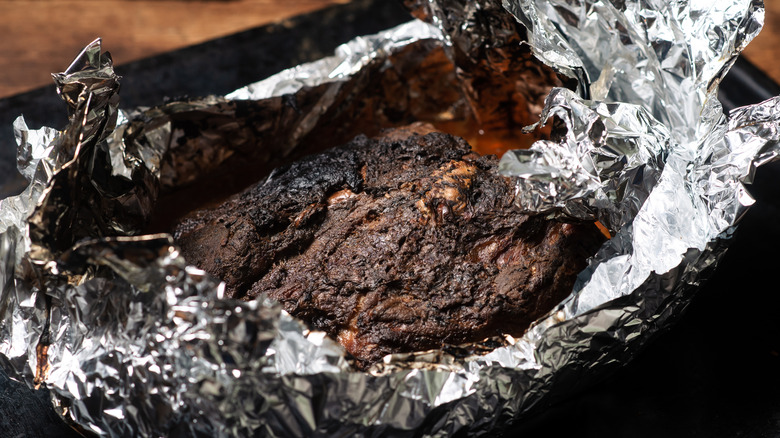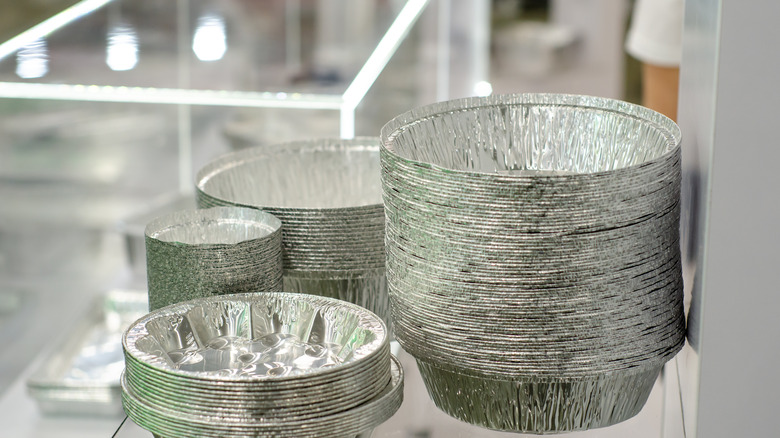The Tin Foil Trick That Prevents Smoky Oven Roasts
You've probably roasted something in the oven before, whether it's a turkey, a chicken, or a pound of roast beef. While nothing quite says Sunday dinner like a roast dinner, with a delicious golden or charred exterior and tender, juicy interior, there's one major problem you may have come across when preparing the roast in the oven. Have you ever opened the oven door and been instantly greeted with a blast of hot smoke and steam that fill your entire kitchen? Your roast thankfully isn't burnt, but now you're stuck trying to ventilate your kitchen to keep it from smelling burnt and musty.
There's nothing you did that caused all that smoke to appear, it's just a by-product of the fat and juices that naturally drip out of the meat, burning off. While this smoke may be more of a nuisance than anything dangerous most of the time, constantly having your oven smoke while you cook a roast can escalate into something dangerous if you don't take care of the matter immediately, such as damaging your oven or causing a fire. If you notice your roasts are smoking too frequently, you must take steps to ensure not only a clean kitchen, but the safety and health of yourself and others.
A very simple method that can reduce, if not outright stop, the chances of your roast turkey or beef generating a cloud of smoke starts with an average sheet of tinfoil — or, more specifically, a ball of tinfoil.
Crumpled-up tinfoil helps with circulation
Circulation is important in an oven: If hot air isn't moving freely around the pan and instead collecting in one spot, it creates an uneven baking surface. This is how fat and juices can wind up causing so much smoke, as the bottom of the pan collects too much heat and burns off these drippings into smoke. This problem of poor circulation can be solved by simply rolling tinfoil into a ball.
Once your sheet of tinfoil is rolled into a ball, you then unwrap it back out into a sheet, being sure not to smooth out any of those wrinkles and ridges. Place this crumpled sheet onto a baking sheet, followed by placing a wire rack on top of the tinfoil sheet. You then put whatever you are roasting onto the rack — your turkey, chicken, beef — and roast it as you normally would. The end result should result in a smoke-free oven and a perfectly done roast.
When you crumple up that tinfoil, it creates air pockets that help to insulate heat. Rather than falling directly onto the hot surface of a roasting pan or baking sheet and exploding into steam, all those drippings will instead pool out on the tin foil, which is a cooler surface in comparison to the surface of the baking sheet. It also makes for easier cleanup, as the foil can easily be tossed away when the roast is done.
You could also use a fat-absorbent barrier
While good circulation and insulation help to ensure that your cooking vessel remains at the optimal temperature, you may wonder if there's a way you could prevent all that fat and juice from collecting. You can't exactly stop a roast chicken from giving up fat, but what if you could absorb it?
A simple method to try has you filling an aluminum pie plate with various absorbers, such as white or brown rice, salt, and even pieces of white bread. Anything that is known to absorb or collect moisture, such as fat or juices, can be used in this method. However, if you have two aluminum pie plates, you can use them both and still collect the fat without having to waste any rice or bread. If you don't happen to have two pie plates, using some leftover white bread or excess rice wouldn't hurt in a pinch.
The main focus you should have, whether you're seeking to collect the drippings or absorb them, is to never let them get exposed to the intense heat as much as possible. Always make sure that your racks and dishes are clean and don't have any spilled juices or grease, and make sure that whatever you're roasting your meat in is of proper size and depth. While these are all very obvious things to do, they play an important role in ensuring that your roast — and your home — are free from smoke or smoke-based hazards.


